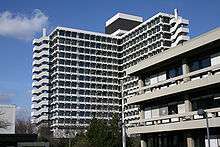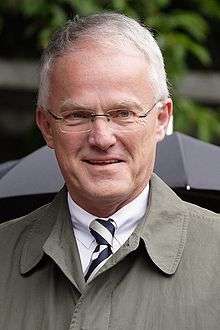Federal Ministry of Education and Research (Germany)
- "BMBF" redirects here. It can also refer to the British Mountain Bike Federation.
| Bundesministerium für Bildung und Forschung (BMBF) | |
 | |
| Agency overview | |
|---|---|
| Formed | 20 October 1955 as Bundesministerium für Atomfragen |
| Jurisdiction | Government of Germany |
| Headquarters |
Heinemannstraße 2 53175 Bonn |
| Employees | 900 |
| Annual budget | € 17.6 billion (2017) |
| Minister responsible |
|
| Agency executives |
|
| Website | http://www.bmbf.de |
The Federal Ministry of Education and Research (German: Bundesministerium für Bildung und Forschung), abbreviated BMBF, is a cabinet-level ministry of the Federal Republic of Germany. It is headquartered in Bonn, with an office in Berlin. The Ministry provides funding for research projects and institutions, regulates nuclear energy, and sets general educational policy. It also provides student loans in Germany. However, a large part of educational policy in Germany is decided at the state level, strongly limiting the influence of the ministry in educational matters.
History
The Federal Ministry for Atomic Issues was established in 1955, concentrating on research in the peaceful use of nuclear energy. The ministry was renamed in 1962 to Federal Ministry of Scientific Research, with a broader scope; it was renamed again, to Federal Ministry of Education and Science, in 1969.
A separate ministry, the Federal Ministry of Research and Technology, was established in 1972. The two Ministries merged in 1994 to form the Federal Ministry for Education, Science, Research and Technology; this title was shortened to Federal Ministry for Education and Research in 1998.
Organization

The BMBF currently has eight departments (as of February 2009). These are in addition to the central department that is responsible for administrative tasks:[1]
- Office 1: Strategies and Policy Issues
- Office 2: European and international cooperation in education and research
- Office 3: Vocational Training and Lifelong Learning
- Office 4: Science
- Office 5: Key Technologies - Research for Innovation
- Office 6: Life Sciences - Research for Health
- Office 7: Provision for the Future - Research on Culture, Basic Science and Sustainability
Each department consists of one or two sub-divisions and 10 to 15 units. The greater part of the subdivision is located at the Bonn office, the smaller part of the Berlin office. Employs about 900 people, the BMBF. The Minister for Education and Research Johanna Wanka. In addition, include two parliamentary secretaries and two civil servants lead the staff.
Federal Ministers
| Name (Born-Died) |
Portrait | Party | Term of Office | Chancellor (Cabinet) | ||
|---|---|---|---|---|---|---|
| Federal Minister for Education, Science, Research and Technology | ||||||
| Jürgen Rüttgers (b. 1951) |
 |
CDU | 17 November 1994 | 26 October 1998 | Kohl (V) | |
| Federal Minister for Education and Research | ||||||
| Edelgard Bulmahn (b. 1951) |
 |
SPD | 26 October 1998 | 22 November 2005 | Schröder (I • II) | |
| Annette Schavan (b. 1955) |
 |
CDU | 22 November 2005 | 14 February 2013 | Merkel (I • II) | |
| Johanna Wanka (b. 1951) |
 |
CDU | 14 February 2013 | Incumbent | Merkel (II • III) | |
See also
- German Historical Institutes
- Perspectivia.net
- Kultusministerkonferenz (Conference of Ministers of Education (State Government in Germany))
References
- ↑ "Organisationsplan des Bundesministeriums für Bildung und Forschung" (pdf). BMBF. p. 1. Retrieved 2009-02-15.